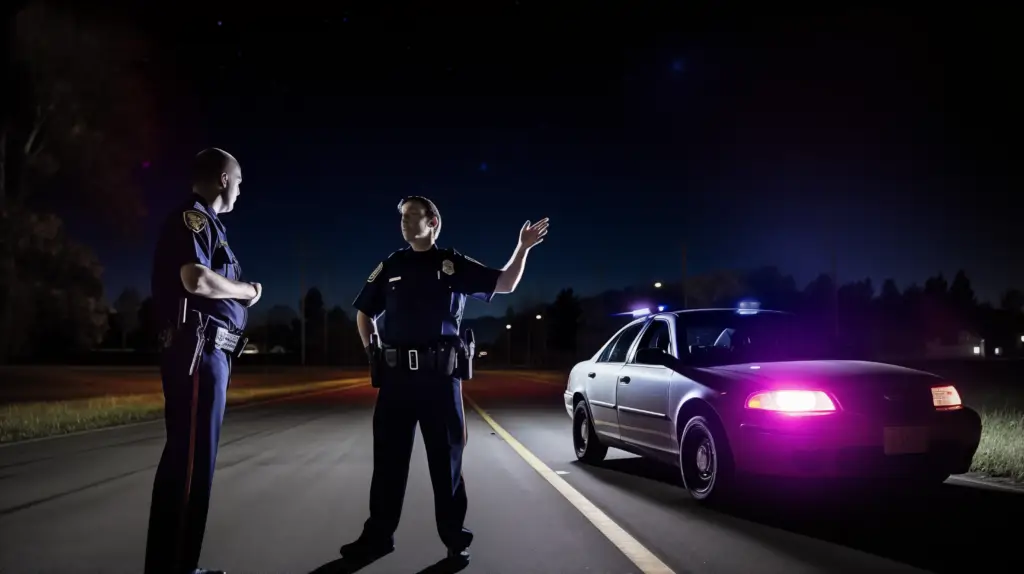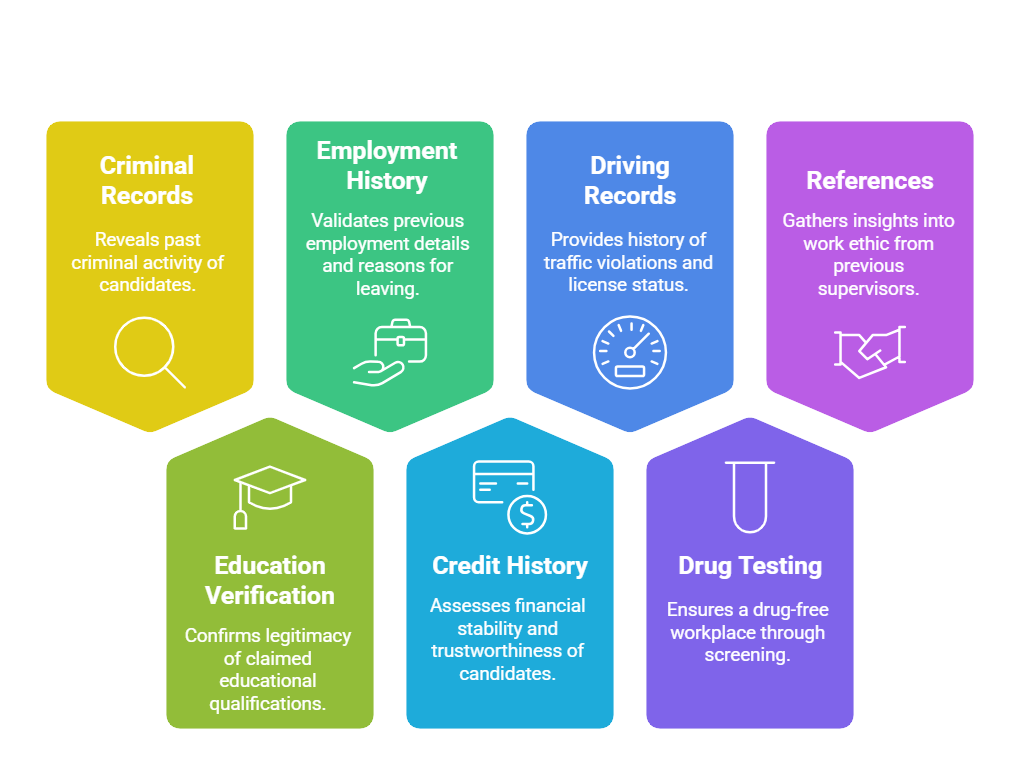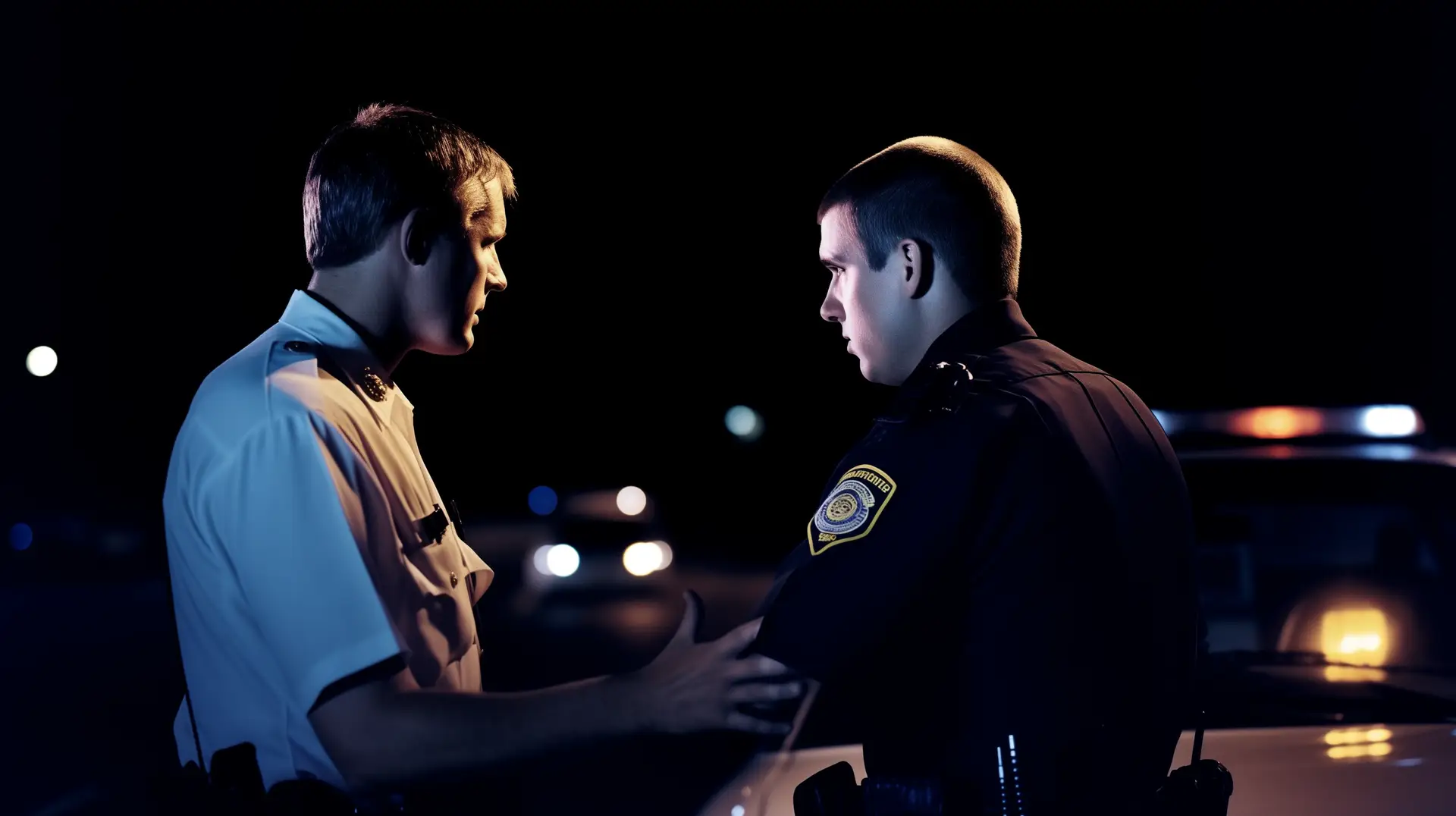Navigating the world of job applications and background checks can be daunting, especially if you have a DUI on your record. Whether you're a business owner, HR professional, recruiter, or job seeker, understanding how a DUI impacts employment is crucial. This comprehensive guide aims to dissect this issue, providing clear insights into how a DUI may affect your background check and what implications it carries for employment across various industries.
Key Takeaways
- A DUI conviction will generally appear on a background check, impacting job prospects significantly, especially in industries like healthcare and transportation.
- Background checks are multifaceted, including criminal, education, employment history, credit, driving records, drug testing, and references.
- The impact of a DUI varies across industries, with sectors like healthcare and transportation being more stringent, while technology and retail might be more lenient.
- Employers must balance legal compliance and fairness, considering EEOC guidelines and state laws when evaluating DUI records in hiring decisions.
- Job seekers should be transparent about DUIs, prepare to discuss the incident, and provide evidence of rehabilitation to mitigate negative impacts.
Introduction
Background checks are a key part of the hiring process and can significantly impact a candidateâÂÂs chances before an interview. A DUI (Driving Under the Influence) is a common concern for both employers and job seekers. This article examines how a DUI conviction can affect employment opportunities, covering legal considerations, industry-specific impacts, and offering practical advice for employers and job seekers. Understanding the relationship between DUIs and background checks is crucial for making informed hiring decisions.

Understanding Background Checks
Understanding what a background check entails is crucial when assessing how a DUI might impact your job prospects. A background check is a process used by employers to verify an individual's history, ensuring the information provided by the candidate aligns with their actual records. The goal is to assess whether the candidate poses any risk to the company or fits the role's requirements.
EXPERT INSIGHT: We have the ability to change lives as HR professionals by using ethical recruiting practices. Let's adopt a fair assessment and redemption mentality when it comes to DUI background checks. We can find untapped potential and promote a culture of growth by looking behind a candidate's background. Recall that the choices we make today affect not only our organizations but also the futures of innumerable people who are looking for a second opportunity. Let's take the lead with empathy, discernment, and a dedication to equal opportunity for all.-
How DUIs Affect the Hiring Process
Definition and Purpose
A background check is essentially an investigative procedure that employers use to verify an applicant's identity, qualifications, and any potential red flags. These checks help employers make informed hiring decisions by providing a clearer picture of who they're bringing into their organization. By scrutinizing the background of a potential employee, companies aim to protect their workplace, assets, and reputation from potential risks associated with hiring someone with a dubious history.
Common Components
Several key components typically make up a comprehensive background check:

These components provide a holistic view of a candidateâÂÂs background, helping employers to assess any risks associated with their employment.
Industry Variations
Background check requirements and their thoroughness can vary significantly across different industries. For example:
- Healthcare: Background checks in the healthcare sector are typically stringent, given the nature of the work involving patient care and safety. DUIs and other criminal records are heavily scrutinized.
- Transportation: For roles involving driving, a deep dive into driving records and any DUIs is critical. Employers in this sector are more likely to weigh DUIs heavily in their decision-making.
- Retail and Hospitality: These sectors may be somewhat more lenient, particularly for non-managerial roles, but public interaction and company policies can vary.
- Technology: Background checks might focus more on prior employment and education. DUIs might be less of an issue unless the role includes public interaction or adherence to strict company policies.
Understanding what a background check covers and how different industries approach them can provide a critical context for both employers and job seekers dealing with DUIs. This insight helps tailor approaches, whether it's in addressing a DUI during an interview or understanding the weight given to various components in different sectors.
DUI and Its Legal Ramifications
Driving under the Influence (DUI) charges are serious and can range from misdemeanors to felonies, depending on the specifics of the incident. A DUI typically involves operating a vehicle while impaired by alcohol or other substances, with blood alcohol concentration (BAC) levels serving as key evidence. The severity of a DUI varies by jurisdiction but generally, a BAC over 0.08% constitutes a DUI offense in many regions.
Legal Consequences
The immediate legal ramifications of a DUI conviction can be substantial and vary based on whether the offense is a first-time or repeat occurrence. Typical penalties include hefty fines, incarceration, and license suspension or revocation. First-time offenders might face lighter sentences, such as short-term imprisonment or probation, alongside mandatory participation in substance abuse programs. However, repeat offenders or those involved in DUI incidents resulting in injury or death can expect more severe consequences, including long-term imprisonment and substantial financial penalties.
Expungement and Sealing Records
For those convicted of a DUI, the possibility of expungement or sealing of records can offer a path to a fresh start. Expungement involves legally erasing the conviction from one's criminal record, while sealing makes the record inaccessible to the general public but still available to law enforcement. The eligibility for these processes varies by state and depends on factors such as the time elapsed since the conviction, completion of all sentencing requirements, and whether it's a first-time offense. Successfully expunging or sealing a DUI record can significantly impact its visibility in background checks, opening doors to employment opportunities that might otherwise be closed.
Will a DUI Affect a Background Check?
When it comes to how a DUI might affect a background check, there are several layers to consider. First off, it's pretty much guaranteed that a DUI will show up on a criminal background check. This includes all the nitty-gritty details: the arrest record, the charges, and the outcome. Most employers run these checks as standard procedures during the hiring process.
Impact on Various Checks
Depending on the job role and industry, different types of background checks may come into play. For instance, a DUI will appear not only in criminal background checks but also in DMV records. Employers in industries where driving is a core function (like transportation and delivery services) will scrutinize these records closely. But that's not allâÂÂsometimes DUIs even show up in public records checks, lending recruiters and HR teams a comprehensive view of an applicant's past.
Time Frame
How long ago the DUI occurred also mattersâÂÂa lot. Recent DUIs are like a fresh stain on your record, often raising more concerns during the hiring process. Older DUIs, especially those that are five, ten, or more years old, might still appear on a background check, but they usually carry less weight. For instance, some employers focus on the last seven years of someone's background, seeing them as more reflective of current behavior and reliability.
Severity of Offense
Then, there's the question of severity. For instance, a first-time DUI might be a misdemeanor, influencing a hiring decision differently compared to multiple offenses or a DUI that resulted in injury or worse. Repeat offenses and more severe charges can raise red flags for employers concerned about liability and workplace safety. In some cases, having a DUI involving aggravating factors like property damage or bodily harm might even result in automatic disqualification for particular roles, especially those emphasizing safety and public trust.
Understanding these nuances helps both job seekers with past DUIs and employers navigate the complexities of the hiring landscape with more confidence and clarity.
Industry-Specific Implications
Staffing Agencies
For staffing agencies, handling candidates with DUI records requires a balancing act between maintaining a robust candidate pool and satisfying client company requirements. On one hand, staffing agencies aim to provide a diverse range of candidates for various job roles. Still, they must also adhere to the strict policies and standards set by their client companies. Agencies typically conduct extensive screenings and make determinations on a case-by-case basis, often influenced by the severity and recency of the DUI offense.
Healthcare
In the healthcare sector, a DUI on one's record can significantly impact employment possibilities due to stringent license requirements and patient safety concerns. Medical boards and regulatory bodies often view a DUI as a red flag, leading to potential delays in certification or outright denials. For professionals already working in healthcare, a DUI could jeopardize current employment, as many healthcare facilities have zero-tolerance policies to ensure patient safety and uphold their reputations.
Transportation
Positions in the transportation industry are perhaps the most directly impacted by DUI convictions. Given the nature of these roles, driving records are critical. A DUI can disqualify a candidate from positions requiring a clean driving history, such as commercial driving or delivery services. Federal and state regulations often dictate stringent compliance standards, leaving little room for leniency regarding DUIs.
Tenant Screening
Although tenant screening primarily concerns housing, the inclusion of DUI records in background checks can influence landlord decisions. A recent DUI may signal potential risk factors like irresponsibility, which might affect a landlord's willingness to rent. However, this guide focuses on employment, so we'll leave the more detailed tenant screening implications for another discussion.
Non-profit
Non-profit organizations often have distinct considerations compared to for-profit companies. The distinction between volunteers and employees is critical; while volunteers might undergo less rigorous checks, employees are usually thoroughly screened. Non-profits may consider how a DUI aligns with their mission and values. For some roles, particularly those involving vulnerable populations, a DUI could be a significant hindrance.
Retail and Hospitality
In retail and hospitality, where roles involve significant public interaction, a DUI might raise concerns about reliability and company reputation. However, these sectors can vary widely in their policies. Some companies may adopt a more lenient approach, particularly if the DUI is an isolated incident and the candidate has shown evidence of rehabilitation. Others may adhere strictly to a no-tolerance policy, especially for roles involving the operation of company vehicles.
Technology
Within the tech industry, the impact of a DUI on employment prospects can be less direct. Many tech roles are behind the scenes, focusing on development, coding, and other non-customer-facing tasks. Here, a DUI may hold less sway unless the company's culture places significant emphasis on personal conduct. However, for tech positions involving driving, travel, or high-level security clearances, the presence of a DUI record could still be a considerable barrier.
Legal Considerations for Employers
Navigating the legal landscape of background checks can be a minefield, especially when dealing with sensitive information like DUI records. Employers must tread carefully to ensure they remain compliant with various guidelines and laws, while also making informed decisions.
EEOC Guidelines
The Equal Employment Opportunity Commission (EEOC) provides clear directives on using criminal history in employment decisions. The EEOC guidelines emphasize that employers must not engage in discriminatory practices based on race, color, national origin, sex, or religion when considering someone's criminal record. They stress the importance of evaluating the nature of the offense, the time elapsed, and the nature of the job in question. Employers should tailor their policies to be job-specific and avoid blanket exclusions based on a DUI record alone.
For a deeper dive into these guidelines, refer to the EEOC Guidance.
State Laws
Beyond federal guidelines, employers also need to navigate state-specific laws, which can vary significantly. Some states have 'Ban-the-Box' laws that prohibit employers from asking about criminal records, including DUIs, on job applications. Others have specific regulations concerning how DUI records should be treated.
For instance, Ohio law requires employers to consider factors like the nature and gravity of the offense, the time that has elapsed since the offense, and the nature of the job being sought before disqualifying an applicant based on a DUI. Pennsylvania law has similar stipulations, particularly emphasizing the need to relate the conviction to the applicant's suitability for the position.
Employers must stay informed about the state laws relevant to their operations and consider consulting legal professionals to ensure compliance.
Practical Application
To mitigate risks and ensure fair hiring practices, employers should:
- Develop Clear Policies: Establish policies that reflect both EEOC guidelines and state laws. Ensure these policies are communicated to all hiring personnel.
- Individual Assessments: Conduct individualized assessments rather than blanket bans, taking into account the details of the DUI and its relevance to the job.
- Document Decisions: Keep thorough records of how hiring decisions were made to provide evidence of compliance with legal standards, should any disputes arise.
By adhering to these legal considerations, employers can balance compliance with fair and responsible hiring practices.
Practical Steps for Job Seekers with a DUI
Full Disclosure vs. Omission
When faced with a DUI on your record, you might wonder whether you should disclose it during the hiring process or hope it goes unnoticed. ItâÂÂs generally advisable to opt for full disclosure. Transparency shows integrity, an essential quality employers look for. Omitting or hiding a DUI can backfire, especially if the employer discovers it through a background check. Most companies appreciate honesty, and addressing the issue upfront may put you in a better light.
Preparation for Questions
Assume the DUI will come up and prepare to discuss it candidly. Rehearse your response to possible questions such as, "Can you explain this DUI on your record?" A straightforward approach combined with accountability works best: briefly outline the incident, take responsibility, and, most importantly, focus on what youâÂÂve learned and how you've changed since then. Highlight any steps youâÂÂve taken to ensure it won't happen again.
Rehabilitation and Mitigation
Demonstrating rehabilitation can significantly mitigate the negative impact of a DUI. This involves more than saying you've learned your lesson. Employers look for tangible proof that reflects positively on your character. Provide certificates from completed rehabilitation programs, character references, or a letter of recommendation from a previous employer who can vouch for your reliability post-incident.
Additionally, involvement in community service or other forms of giving back can provide solid evidence that youâÂÂre committed to positive change. These actions underscore a proactive approach to personal growth and responsibility, helping to paint a comprehensive picture beyond the DUI.
By following these steps, you can address a DUI in a manner that minimizes its impact and reinforces your commitment to moving forward positively.
Tools for Employers and Self-Checks
Having the right tools and methods at your disposal can significantly impact how effectively you manage background checks. Whether you're an employer looking to make informed hiring decisions or a job seeker aiming to be proactive, here are some essential tools and strategies.
Conducting Comprehensive Checks
Utilizing a reliable background check service stands at the forefront of thorough vetting processes. Employers should invest in reputable providers known for their accuracy and comprehensive data. Companies like HireRight, Sterling, and GoodHire offer robust solutions, ensuring you get a wide-ranging view of a candidate's history, including potential DUI records.
SSN Trace Background Check
An SSN Trace is a foundational tool in the background check arsenal. By tracking the history of addresses associated with an individual's Social Security Number, this check can help verify identity and uncover potential aliases. This foundational level of scrutiny ensures that all subsequent background checks are accurate and complete, providing the peace of mind that you're not missing any data.
Background Check for Self
Job seekers, consider conducting your background check before any job application. Services like GCheck offer personal background checks. Understanding what potential employers will see gives you a strategic advantage. It allows you to prepare for any red flags and craft a narrative that addresses them head-on, demonstrating responsibility and transparency.
Non-Profit Background Checks
When it comes to non-profits, background checks may involve specific considerations, particularly for roles involving vulnerable populations. Services like Verified Volunteers or Sterling Volunteers cater specifically to the non-profit sector, offering tailored solutions that balance thoroughness with the nuanced needs of volunteer-driven organizations. These services often include specialized checks, such as those focused on safeguarding children and dependent adults.
Employers and job seekers alike must navigate the complexities of background checks with diligence and foresight. Properly leveraging these tools can make a significant difference in the hiring process, ensuring that decisions are informed, fair, and in compliance with legal standards.
FAQs
Will a dismissed DUI show on a background check?
A dismissed DUI may still appear on a background check, depending on the type of check conducted and the thoroughness of the screening process. While a dismissal means you weren't convicted, the initial charge and the dismissal could still be documented. ItâÂÂs crucial to verify and understand your specific state laws regarding how dismissed charges are reported.
Do I have to disclose a misdemeanor after 7 years?
The requirement to disclose a misdemeanor after 7 years can vary by state and the policies of the employer. Some states have "ban the box" laws or limitations on how far back a background check can look for non-violent misdemeanors. Be sure to check local regulations and understand the specific application question context.
Does a background check show if you graduated?
Yes, a background check can reveal whether you graduated, especially if the check includes education verification. This type of verification confirms your attendance dates, degrees earned, and the institutions you attended. Misrepresenting educational qualifications can be easily spotted through this component of the background check.
Will a DUI come up on a background check?
Yes, a DUI will generally appear on a criminal background check. It's a significant entry thatâÂÂs typically included in criminal records, driving records, and sometimes even employment history checks if it is job-related. The impact it has can vary based on the time elapsed since the offense, the employer's industry, and specific job requirements.
Conclusion
Both employers and job seekers must be aware of how a DUI affects background checks. The severity, timeliness, industry standards, and legal requirements of the infraction all affect the consequences. Although a DUI will show up on a criminal history check, the effect varies depending on the position and industry.
While job seekers should be forthright and honest about their past and demonstrate signs of personal development, employers should strike a balance between worker safety, justice, and rehabilitation.
Employers are required to follow pertinent rules and implement trustworthy background check procedures. Candidates for jobs should be open and honest about their records. A clear understanding can help both parties make equitable employment decisions.

GCheck Editorial Team
Meet the GCheck Editorial Team, your trusted source for insightful and up-to-date information in the world of employment background checks. Committed to delivering the latest trends, best practices, and industry insights, our team is dedicated to keeping you informed.
With a passion for ensuring accuracy, compliance, and efficiency in background screening, we are your go-to experts in the field. Stay tuned for our comprehensive articles, guides, and analysis, designed to empower businesses and individuals with the knowledge they need to make informed decisions.
At GCheck, we're here to guide you through the complexities of background checks, every step of the way.






